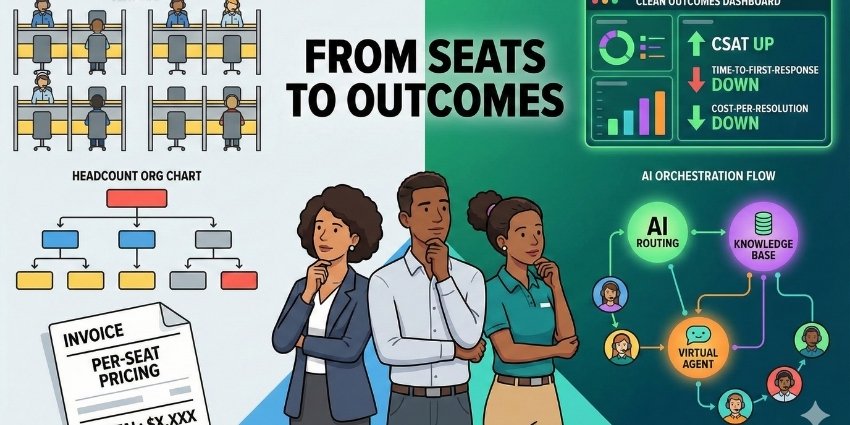In July, two US senators proposed the “Keep Call Centers in America Act of 2025”.
If it passes, the bill would serve two primary purposes:
- Ensure customers always have the option to speak with a human support agent.
- Keep US contact center jobs in the country.
Initially, many hailed the bill as it gives consumers more transparency and choice.
However, industry analysts are now warning that the bill, while well-intentioned, could create more problems than it solves.
A Closer Look at the Keep Call Centers in America Act of 2025
Under the new bill, customer service agents must disclose their location and use of AI to customers at the beginning of an interaction.
If their location is outside the US, the regulation would force the company to transfer the contact to a US-based rep upon request.
The bill would also compel businesses with 50+ employees to notify the Department of Labor (DOL) at least 120 days before moving contact center work overseas.
The DOL will then maintain a public list of employers that offshore contact center work, keeping them listed for five years unless jobs return or contracts change to keep work in the US.
All businesses on the list will become ineligible for new federal grants and loans, with potential penalties and cancellations applying to existing awards if companies remain listed.
Additionally, it will require federal agencies to prioritize US-based employers not on the list when awarding contracts, and mandate that all federal contract contact center work happens in the US.
Lastly, the bill will demand the DOL to report on federal call center work, including job losses tied to the use of AI.
Everything That’s Wrong with the Bill
Customer experience analysts have highlighted several concerns swirling the Keep Call Centers in America Act of 2025.
After distilling these, here are three core problems that the bill could introduce for regulators, businesses, and consumers.
Problem #1 – It Doesn’t Seem Enforceable
Here’s a story to set the scene. “Yesterday, I kept getting calls from a number with a 747 area code, which is local here in the San Fernando Valley,” said Liz Miller, VP & Principal Analyst at Constellation Research. “They called me four times.
“So, I finally looked up the number. Turns out it was a Twilio number. With a reverse lookup, I discovered it was routed through Sudan, Kansas, then relayed from the Philippines, before hitting me in Los Angeles with a 747 area code,” continued Miller.
Think about that: the contact center was clearly in the Philippines, but because the company had US headquarters in Sudan, Kansas, the call showed as local. Under this legislation, that company could still claim: “We’re in America.”
As a result, the legislation may not accomplish what it’s supposed to and perhaps shows that lawmakers don’t fully understand what they’re regulating from a technical perspective.
Problem #2 – It May Hurt Businesses Trying to Improve Service Experiences
Consider Miller’s example. The bad actors? Those who spam customers incessantly, they won’t care. Instead, they’ll just keep spoofing calls through Kansas.
Instead, the Act will make well-intentioned companies with solid practices and customer experience strategies nervous.
Of course, some businesses have tried to hide their AI use or over-automate, making it almost impossible to reach a human.
However, as Justin Robbins, Founder & Principal Analyst at Metric Sherpa, told CX Today: “Most businesses I talk to don’t see AI as full automation, they see it as augmenting human capacity.
The lesson here is simple: people want transparency, trust, and fast resolution. They don’t want complexity and cost, which will be the outcome if this goes too far.
Problem #3 – It Does Little to Address Real Consumer Issues
The bill could challenge “doom loops”, where customers interact with AI or IVR mazes without exit routes.
However, with more consumers being pushed into a US call queue, without AI to help lessen the load, wait times may surge. That could frustrate customers, put more pressure on human agents, and add to a business’s cost sheet.
The result? Those extra costs may pass on to the consumer, too.
Additionally, while the bill may help escalate to a human, it does little else to tackle the rising issue of “customer sludge”, which typically frustrates customers more than the location of who they’re talking to.
Customer sludge includes all the blockers some brands put in front of customers to prevent them from making moves they deem unfavorable, like cancelling their subscription.
Do We Really Need to Mandate Human Support?
While some may view the bill as an extension of pro-American sentiment, the notion of safeguarding human contact center agents’ jobs is heartwarming.
Indeed, with prominent AI thought leaders, like Sam Altman, CEO of OpenAI, recently predicting the demise of human customer service, the move seems positive for industry onlookers.
However, many others have challenged Altman’s prediction. For example, Gartner recently suggested that half of businesses will abandon plans to lower their contact center headcount by 2027.
Meanwhile, Zeus Kerravala, Principal Analyst at ZK Research, warned against over-regulation.
“Historically, things usually work themselves out,” he said. “For example, with the shift to online banking, people initially said, “I’ll never use a machine to deposit checks.” But they eventually did, while still having the option to go into a bank.
“Some banks like Juniper or Venmo initially had no live agents, assuming their demographic wouldn’t need them… But consumer demand eventually brought those roles back.
So yes, there’s a lot of pro-American sentiment right now. But forcing agents to disclose they’re offshore could create hostility toward brands, even if offshoring is the right business decision.
Given this, while the bill may be nice in spirit, it could result in more complexity and cost than it’s potentially worth.
Miller, Robbins, and Kerravala discussed the Act as part of CX Today’s latest Big News Update video. Joined by two other expert analysts, they also gave their takes on the recent Verint takeover and Salesforce’s acquisition streak. Make sure you don’t miss the video’s release. Subscribe to the CX Today Newsletter.







